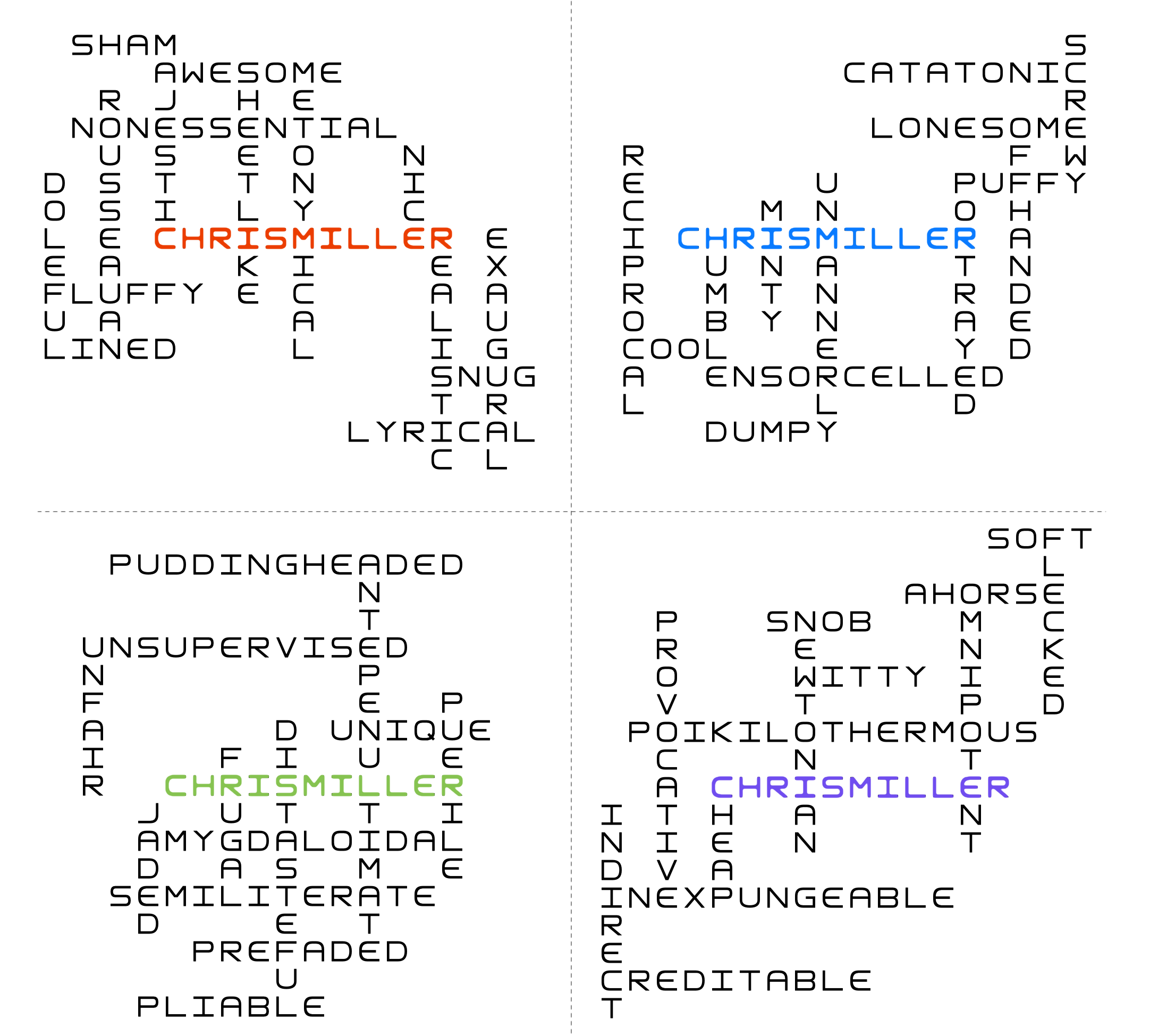I completely believe that displaying a purchased canvas of "A Starry Night" - although beautiful - totally misses the inherit personal nature of art. With this in mind, I acquired a used copy of Scrabble for some board game themed wall art! My goal: scrabbly connecting a bunch of adjectives to my name.
Instead of manually finding a hodgepodge of properly connected adjectives, I decided to automate this search. In a nutshell, this super naive algorithm boils down to a 2 dimensional regex solver that randomly samples adjectives from Wordnet.

import argparse
import random
import re
import numpy as np
from nltk.corpus import wordnet as wn
class Scrabbler():
def __init__(self, my_name, board_size):
self.name = my_name
self.board_size = board_size
self.board = np.empty([board_size, board_size], dtype=object)
self.board[:] = r'.?'
self.used_words = []
self.look_at_rows = False
self.read_clean_word_list()
self.place_name_on_board()
def read_clean_word_list(self):
all_words = set()
for adjective in wn.all_synsets(wn.ADJ):
# Remove Roman Numerals
if 'more than' in adjective.definition():
continue
for lemma in adjective.lemma_names():
if lemma.isalpha() and len(lemma) < self.board_size:
all_words.add(lemma.lower())
self.all_words = list(all_words) + [self.name]
def place_name_on_board(self):
starting_loc = (self.board_size - len(self.name)) // 2
end_loc = starting_loc + len(self.name)
center_row = self.board_size // 2
self.board[center_row][starting_loc:end_loc] = list(self.name)
@staticmethod
def try_to_place(line, word):
if any(characters.isalpha() for characters in line):
smushed_line = f'^{"".join(line)}$'
smushed_line_regrex = re.compile(smushed_line)
if smushed_line_regrex.search(word):
num_characters_in_line = sum(
characters.isalpha() for characters in line
)
word_length = len(word)
for position in range(0, len(line) - word_length):
new_line = [' '] * len(line)
new_line[position:position+word_length] = list(word)
total_in_common = sum(
1 if a == b else 0 for (a, b) in zip(line, new_line)
)
if total_in_common == num_characters_in_line:
revert_back_to_regex = [
'.?' if c == ' ' else c for c in new_line
]
return revert_back_to_regex
def placeWord(self, board, word):
self.temp_board = None
copied_board = np.copy(board)
for index, line in enumerate(board):
letters_in_common = set(line).intersection(set(word))
if len(letters_in_common) > 0:
new_word = self.try_to_place(line, word)
if new_word:
copied_board[index] = new_word
self.temp_board = copied_board
break
def check_for_valid_lines(self):
if self.temp_board is None:
return False
for temp_board_orientation in [self.temp_board, self.temp_board.T]:
for row in temp_board_orientation:
words = row.sum().replace('.?', ' ').split()
for word in words:
if len(word) > 1:
if not word in self.all_words:
return False
return True
def add_valid_word_to_board(self):
random.shuffle(self.all_words)
for word in self.all_words:
if word in self.used_words:
continue
if self.look_at_rows:
self.placeWord(self.board, word)
else:
self.placeWord(self.board.T, word)
is_valid = self.check_for_valid_lines()
if is_valid:
if not self.look_at_rows:
self.temp_board = self.temp_board.T
self.board[:, :] = self.temp_board
return word
def print_board(self):
print('\n')
for row in self.board:
clean_row = "".join(row).replace(".?", " ")
print(clean_row)
def run(self):
while True:
valid_word = self.add_valid_word_to_board()
print('.', end="", flush=True)
if not valid_word:
break
self.look_at_rows = ~self.look_at_rows
self.used_words.append(valid_word)
self.print_board()
def check_wordnet_exists():
try:
wn.fileids()
except LookupError:
print('Downloading wordnet, is this okay? (y/n)')
if input() == 'y':
import nltk
nltk.download('wordnet')
else:
exit()
if __name__ == '__main__':
parser = argparse.ArgumentParser()
parser.add_argument('--name', nargs='*', help='Sets your name')
parser.add_argument('--size', type=int, default=15,
help='Sets the size of the board')
parser.add_argument('--iter', type=int, default=1,
help='Sets the number of boards generated')
args = parser.parse_args()
my_name = "".join(args.name).lower()
board_size = args.size
number_of_iterations = args.iter
if not my_name:
print("Missing `--name <My Name>` argument")
exit()
elif len(my_name) > board_size:
board_size = len(my_name)
check_wordnet_exists()
print('Running Scrabbler\n')
for _ in range(number_of_iterations):
scrabbler = Scrabbler(my_name, board_size)
scrabbler.run()